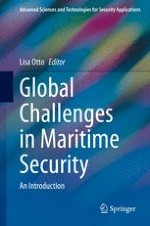2020 | OriginalPaper | Buchkapitel
14. Connecting the Dots: Implications of the Intertwined Global Challenges to Maritime Security
verfasst von : Anja Menzel, Lisa Otto
Erschienen in: Global Challenges in Maritime Security
Verlag: Springer International Publishing
Aktivieren Sie unsere intelligente Suche, um passende Fachinhalte oder Patente zu finden.
Wählen Sie Textabschnitte aus um mit Künstlicher Intelligenz passenden Patente zu finden. powered by
Markieren Sie Textabschnitte, um KI-gestützt weitere passende Inhalte zu finden. powered by
